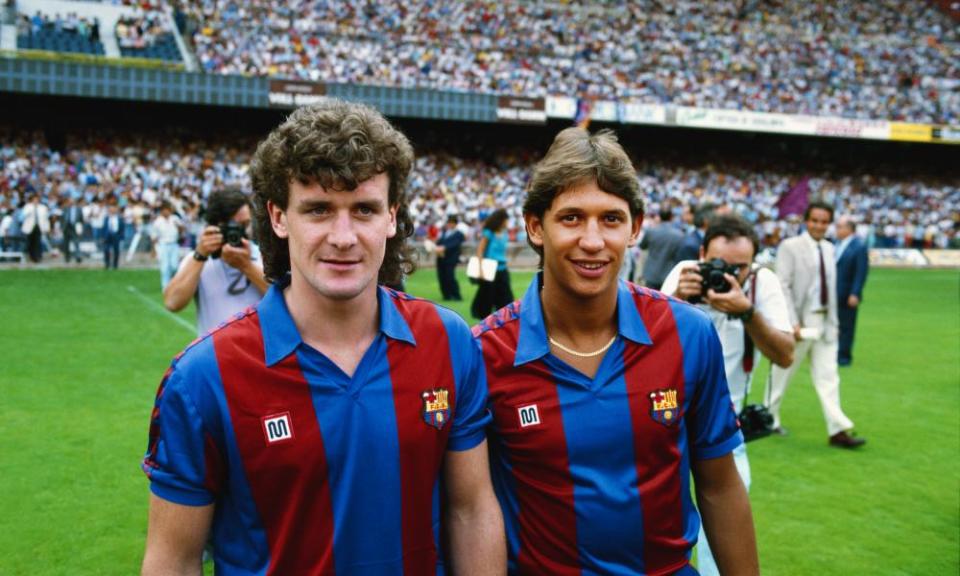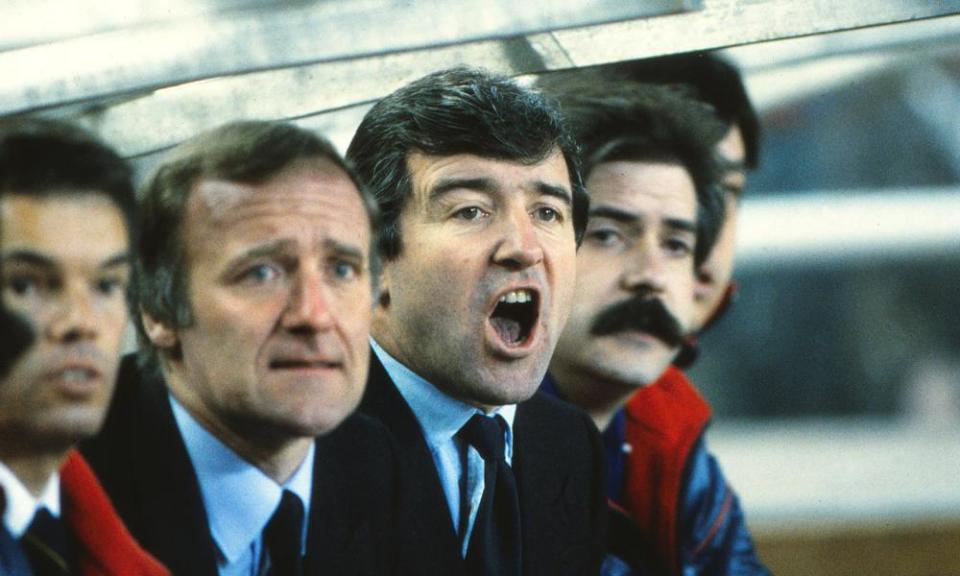When Terry Venables told Jim Gregory he had an interview to become a coach at Barcelona, the QPR chairman just laughed and wished him the best of luck. The man they were coming to call sir later admitted that he was “flattered that they had even heard of me” – many had not. He spent his first day in the city alone on the Ramblas and eventually climbed out of the window to escape the journalists hammering on his hotel room door, wanting to know more about the new man. Starting with the basics, which they never quite understood: “It is pronounced Véneibols, with the emphasis on the first ‘e’,” Mundo Deportivo reported. He was, says striker Pichi Alonso, “a complete unknown”.
Twelve months later, Venables had led Barcelona to the league title, the first they had won in eleven years, only their second in a quarter of a century. A year later he had taken them to a penalty shootout for a first European Cup, and the ensuing eternity. He had never felt so depressed after a defeat. “That had a devastating effect on him,” recalls Gary Lineker, who joined soon afterwards and ate with Venables a few times a week, tactics on the table, glasses here, forks there. “I knew they had lost the final but didn’t notice that I had joined a club in mourning and it was like, ‘Oh, this isn’t the best of times.'”
Barcelona had been so close to it being the very best time in their history, their everything, celebrated forever. Instead, as Venables continued for another year, eventually running four weeks into the 1987-88 season, something had broken.
Related: Terry Venables was a football romantic who made every player feel like a star
Take a step back and what Venables did in Catalonia was extraordinary. What he experienced was also: a life well lived. Sure, his Pyrenean mountain dog Bilko was too big and got him into trouble, but there was singing in the Up & Down club and there was a transformation on the field. Today that is recognised, with every newspaper in Catalonia pointing out his death and the affection is clear. “Adios, sir” read the headlines.
“That European Cup should have been historic, the first,” said Steve Archibald. “It became a trauma and everything was torn apart. But it was our team that brought Barcelona out of the darkness. I thought Terry was a genius at the time and I don’t think he got enough credit for what he did. I thought it was wonderful.”
It had not been the best time for Venables to arrive either. Barcelona were a club in crisis, with Diego Maradona suspended for three months and on the verge of leaving, players and board at war. César Luis Menotti, the outgoing coach, had suggested to Venables that he take charge early, which was less an offer than an attempt to get out of there, a trap his successor avoided. Menotti was the eighth manager in five years. Bobby Robson had turned them down for the second time, but recommended his compatriot to Joan Gaspart, an English-speaking vice president. Venables was a young coach, different, Robson said.
At the end of his job interview, Venables pulled a cigar from his sock and handed it to the other vice president, Nicolau Casaus. That convinced him, Venables would later claim. For others it took a little longer, but not much. At 41, coming from QPR, Venables was acutely aware of the idea that here was an English guy they’d picked up off the beach. He won’t make it to Christmas, one columnist insisted. Three years and three months later he finally went. No one had lasted that long since Ferdinand Daucik in 1950-54.
“English managers were judged, but there was doubt about them outside England; we thought they were not very good tactically,” Alonso admits. “And that was exactly where Terry showed he was good: tactically and strategically he was excellent. And the team worked extremely hard physically; maybe we paid for that in the second season. He was also a good guy: cheerful, empathetic… he reached you. He was closer, more sincere than Menotti.’ That summer, Alonso’s daughter was involved in a serious accident; he remembers the new manager showing up at the hospital with a huge stuffed animal under his arm.

The full-back Julio Alberto would later say that Venables had done the opposite of what they expected of him. The system, adapted from what he had seen Liverpool do and introduced during the preparation in Andorra, quickly convinced them. Archibald, who insisted on bringing in Venables to replace Maradona and chose Hugo Sánchez (no pressure, friend), believes the press was born there. “I don’t know if we had an impact on that [Pep] Guardiola, but we did it first,” he says.
Perhaps the best response is a photo. You may have seen it in recent days: Venables on the shoulders of centre-back Migueli, in celebration of reaching the European Cup final. The ball boy who looks up at him admiringly is Guardiola. On either side of Venables are the only league titles Barcelona has won in forty years, with Johan Cruyff’s fingerprints on them. Listen to Lineker talk about those long lunches and the admiration for a coach who has seen the game like no other is overwhelming.
“We played a 4-4-2 with a diamond,” Alonso recalls. “He would identify which full-back was weakest and isolate him so he could receive, and then we would chase him down and cut off all his escape routes. We used these diagonal runs from the point of the diamond to the wide areas, where the moves started, which no one had. He introduced set pieces and corners where a line of players would stand, forming a screen [José Ramón] Alexanko, who scored a lot that season. Nobody did that at the time and coaches fell for it by putting their biggest man on him, who then just got blocked.”
It all started at the Bernabéu. There was pessimism in the area and the opening of the season there pleased no one – except Venables, who was excited about the opportunity. That turned out to be contagious, at least after they won. Alonso remembers: “It didn’t work, you replace Maradona with Archibald, who wasn’t that well known, and people thought: ‘If it wasn’t like that last year, what are the chances this year?'” Barcelona won by 3 -0, with Archibald scoring.
Barcelona won the competition with a penalty save from Javier Urrutikoetxea, which provoked perhaps the most famous radio comment in the club’s history when Joaquim Puyal shouted: “Urruti, I love you!” But if that sounds close, it wasn’t: there were still four weeks to go and at a time when it was still two points for a win, Barcelona won the title by 10 points over Atlético Madrid and 17 points ahead of Real Madrid. . More than 100,000 people were on the streets to celebrate, and the scenes were wild. A year later, almost as many people were in Seville for the European Cup final against Steaua Bucharest.
In the first leg of the semi-final, Barcelona lost 3–0 in Gothenburg when Venables decided not to field Alonso, his only striker, opting instead for a central defender named Esteve Fradera. “I thought: if I don’t play today, I’ll never do it again,” says Alonso. “It was a catastrophe, and I said so.”


“Three or four days later he calls me over. He says, ‘I know you’re mad at me. But if you are a manager, and I know you will be one day, you will realize that what the majority of people would do is not always the right thing to do. If we had lost 4-0 or 5-0, there would have been no chance. That is still the case now.’ Inside I can’t believe what I’m hearing, I’m pissing myself. ‘That’s right. There is a chance. Certainly.’ But the thing is, he was right. It happened. Before the return match he calls me in and says, ‘Don’t tell anyone, but you’re playing.’ I say, ‘I won’t even tell my wife.’” Barcelona won 3-0 and advanced on penalties. Alonso scored a hat-trick.
It was done. They had battled through Porto, Juventus and now Gothenburg, always on edge, but at last Barcelona would become European champions. This was their great obsession, all they ever wanted. The final took place in Seville, practically at home, in front of tens of thousands of fans, against a team that had no chance.
Which might be part of the problem. There were problems everywhere. Barcelona’s players were tired and burned out. There were injuries and a rift within the club, between the presidency and the players, which also strained the relationships Venables had with some of them. Bernd Schuster was taken off the field late in the game and walked straight out of the stadium. In 120 minutes and four terrible penalties, which no one wanted to take and the pressure was unbearable, Barcelona did not score. Bucharest goalkeeper Helmuth Duckadam was the unexpected hero. The pain never really went away.
“We had gone eleven years without winning the competition: 11,” says Alonso. ‘But the latter buried it and threw earth over it. We were the team, forever. Instead, we were the damned, cursed. You know, if we had lost the semi-final, things would have gone well. But then that happened. We were so close. And if we win the European Cup, they will build a statue for Terry.”